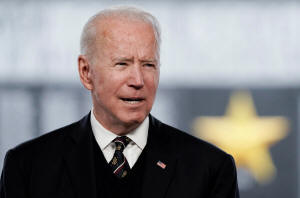Biden to visit Tulsa massacre site as U.S. confronts racial legacy
 Send a link to a friend
Send a link to a friend
 [June 01, 2021]
By Jeff Mason and Heather Timmons [June 01, 2021]
By Jeff Mason and Heather Timmons
WASHINGTON (Reuters) - Joe Biden on Tuesday
will become the first sitting U.S. president to visit the site of the
massacre of hundreds of Black Americans by a white mob in Tulsa,
Oklahoma, as he marks one of the worst chapters in the country's history
of racial violence.
Biden, a Democrat, will meet with the handful of surviving members of
the Greenwood community on the 100th anniversary of the killings, and
announce steps to combat inequality, White House officials said.
They will include plans to expand federal contracting with small,
disadvantaged businesses, invest tens of billions of dollars in
communities like Greenwood that suffer from persistent poverty and
pursue new efforts to combat housing discrimination.
The president will speak about the U.S. legacy of racism and acknowledge
the challenges going forward, an administration official said, noting he
cannot fulfill his promise to restore the "soul" of the nation without
recognizing the complexity of its history.
In a proclamation on Monday, Biden asked all Americans to "reflect on
the deep roots of racial terror in our Nation and recommit to the work
of rooting out systemic racism across our country."

His visit comes during a racial reckoning in the United States as the
country's white majority shrinks, threats increase from white
supremacist groups and the country re-examines its treatment of African
Americans after last year's killing of George Floyd, an unarmed Black
man, by a white Minneapolis police officer, which sparked nationwide
protests.
Biden, who won the presidency on the strength of Black voter support,
made fighting racial inequality a key platform of his 2020 campaign and
has done the same during his short tenure in the White House. He met
last week with members of Floyd's family on the anniversary of his death
and is pushing for passage of a police reform bill that bears Floyd's
name.
Biden's trip to Tulsa will also offer a sharp contrast to a year ago,
when then-President Donald Trump, a Republican who criticized Black
Lives Matter and other racial justice movements, planned a political
rally in Tulsa on June 19, the "Juneteenth" anniversary that celebrates
the end of U.S. slavery in 1865. The rally was postponed after
criticism.
"Now here we are a little less than a year later with a new president
going down to Tulsa to ... denounce the massacre of innocent
African-American brothers and sisters, denouncing racism in his trip,
encouraging Americans to come together," said Moe Vela, a former adviser
to Biden.
Public awareness about the killings in Tulsa on May 31 and June 1, 1921,
which were not taught in history classes or reported by local newspapers
for decades, has grown in recent years.
[to top of second column]
|

President Joe Biden delivers remarks at an annual Memorial Day
Service at Veterans Memorial Park, Delaware Memorial Bridge, New
Castle, Delaware, U.S., May 30, 2021. REUTERS/Ken Cedeno

White residents shot and killed an estimated 300
Black people and burned and looted homes and businesses, devastating
a prosperous African-American community after a white woman accused
a Black man of assault, an allegation that was never proven.
Insurance companies did not cover the damages and no one was charged
for the attacks.
BIDEN'S COMPLICATED HISTORY ON RACE
Biden's public stance on race and equality has evolved over the
decades.
He won the Democratic presidential nomination last year largely
because of Black voters, whose support helped him clinch the South
Carolina primary, which turned around his campaign.
Biden earned their goodwill as vice president under Barack Obama,
the first Black U.S. president, and chose Kamala Harris, the child
of a Black father from Jamaica and an Indian mother, to be his
running mate.
But he came under fire during the 2020 campaign for his opposition
to school busing programs in the 1970s that helped integrate
American schools. Biden sponsored a 1994 crime bill that civil
rights and justice experts say contributed to a rise in mass
incarceration, and defended his work with two Southern
segregationist senators during his days in the U.S. Senate.
"We all evolve, we grow, we learn. And I credit him for that," Vela
said.
Biden "does not seem to be the Joe Biden of the crime bill, but he
has never repudiated the crime bill,” said William Darity Jr., a
professor at Duke University, who co-wrote “From Here to Equality:
Reparations for Black Americans in the Twentieth Century."

The Tulsa visit would be a meaningful time to announce a
presidential commission to "explore the history of America’s racial
atrocities, and bring forth proposals for racial justice," Darity
said.
The racial justice issue also figures in the growing battle over
voting rights. Multiple Republican-led states, arguing a need to
bolster election security, have passed or proposed voting
restrictions, which Biden and other Democrats say are aimed at
making it harder for Black and other minority voters to cast
ballots.
(Reporting by Jeff Mason and Heather Timmons; Editing by Peter
Cooney)
[© 2021 Thomson Reuters. All rights
reserved.] Copyright 2021 Reuters. All rights reserved. This material may not be published,
broadcast, rewritten or redistributed.
Thompson Reuters is solely responsible for this content. |